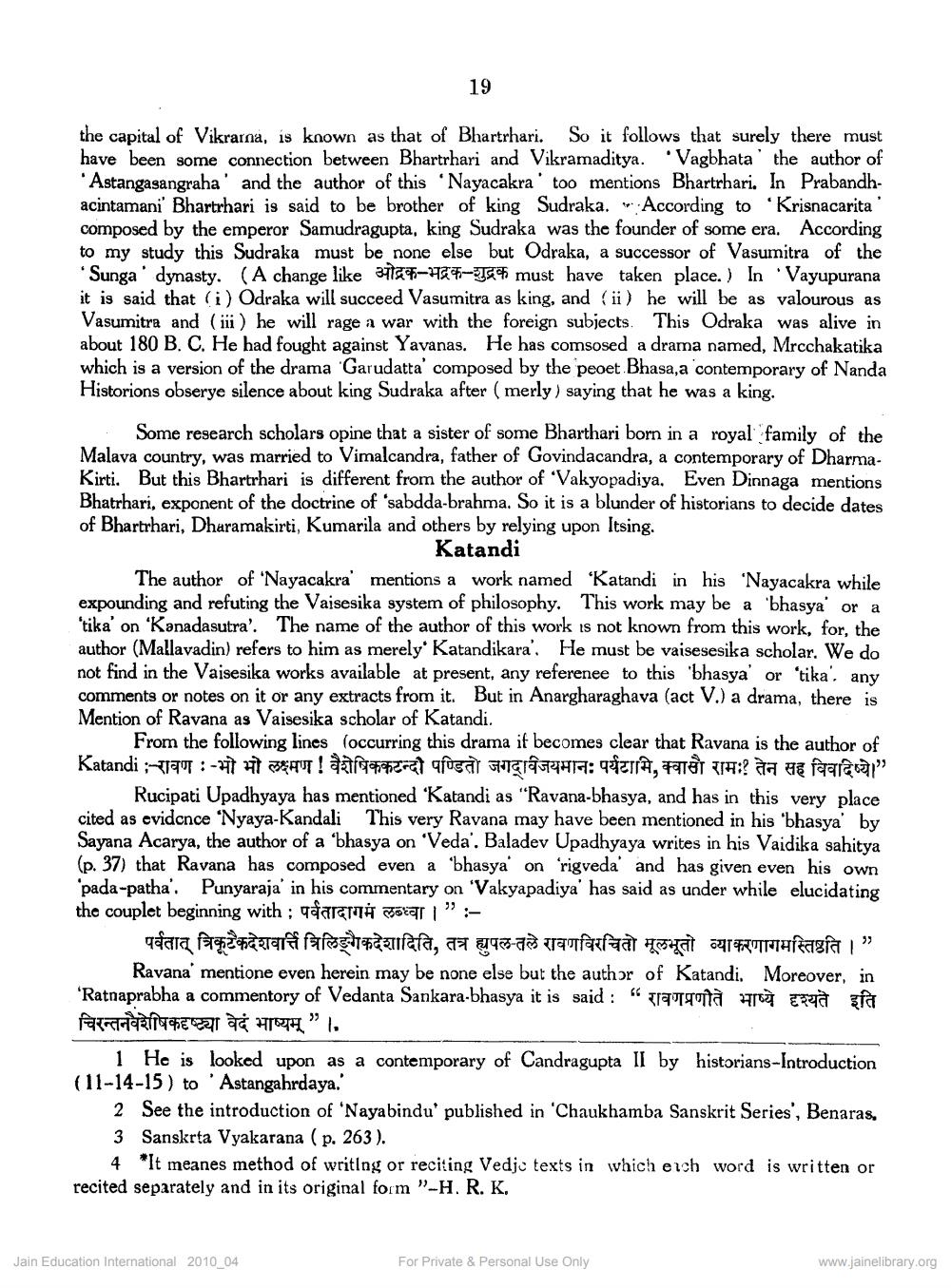________________
19
the capital of Vikrarna, is known as that of Bhartrhari. So it follows that surely there must have been some connection between Bhartrhari and Vikramaditya. "Vagbhata' the author of *Astangasangraha' and the author of this 'Nayacakra' too mentions Bhartrhari. In Prabandhacintamani' Bhartrhari is said to be brother of king Sudraka. According to "Krisnacarita' composed by the emperor Samudragupta, king Sudraka was the founder of some era. According to my study this Sudraka must be none else but Odraka, a successor of Vasumitra of the
Sunga' dynasty. (A change like 37154-454-15must have taken place.) In Vayupurana it is said that (i) Odraka will succeed Vasumitra as king, and (ii) he will be as valourous as Vasumitra and (iii) he will rage a war with the foreign subjects. This Odraka was alive in about 180 B. C. He had fought against Yavanas. He has comsosed a drama named, Mrcchakatika which is a version of the drama Garudatta' composed by the peoet Bhasa, a contemporary of Nanda Historions obserye silence about king Sudraka after (merly) saying that he was a king.
Some research scholars opine that a sister of some Bharthari born in a royal family of the Malava country, was married to Vimalcandra, father of Govindacandra, a contemporary of DharmaKirti. But this Bhartrhari is different from the author of 'Vakyopadiya. Even Dinnaga mentions Bhatrhari, exponent of the doctrine of 'sabdda-brahma. So it is a blunder of historians to decide dates of Bhartrhari, Dharamakirti, Kumarila and others by relying upon Itsing.
Katandi The author of 'Nayacakra' mentions a work named "Katandi in his 'Nayacakra while expounding and refuting the Vaisesika system of philosophy. This work may be a 'bhasya or a 'tika' on 'Kanadasutra'. The name of the author of this work is not known from this work, for, the author (Mallavadin) refers to him as merely' Katandikara. He must be vaisesesika scholar. We do not find in the Vaisesika works available at present, any referenee to this 'bhasya' or 'tika', any comments or notes on it or any extracts from it. But in Anargharaghava (act V.) a drama, there is Mention of Ravana as Vaisesika scholar of Katandi.
From the following lines (occurring this drama it becomes clear that Ravana is the author of Katandi :- Tar:-31 H EA! 1992 rat qfusat GIF ht: qTTA, FETAT TH:? Ma ne fare."
Rucipati Upadhyaya has mentioned "Katandi as "Ravana-bhasya, and has in this very place cited as evidence 'Nyaya-Randali This very Ravana may have been mentioned in his 'bhasya' by Sayana Acarya, the author of a 'bhasya on 'Veda'. Baladev Upadhyaya writes in his Vaidika sahitya (p. 37) that Ravana has composed even a 'bhasya on rigveda and has given even his own 'pada-patha. Punyaraja in his commentary on 'Vakyapadiya' has said as under while elucidating the couplet beginning with ; पर्वतादागमं लब्ध्वा ।":
पर्वतात् त्रिकूटकदेशवर्ति त्रिलिजैकदेशादिति, तत्र ह्यपल-तले रावणविरचितो मूलभूतो व्याकरणागमस्तिष्ठति ।"
Ravana' mentione even herein may be none else but the author of Katandi. Moreover, in 'Ratnaprabha a commentory of Vedanta Sankara-bhasya it is said : “ raud r fa F REE OTH” l.
1 He is looked upon as a contemporary of Candragupta II by historians-Introduction (11-14-15) to 'Astangahrdaya.'
2 See the introduction of 'Nayabindu' published in 'Chaukhamba Sanskrit Series', Benaras, 3 Sanskrta Vyakarana (p. 263).
4 *It meanes method of writing or reciting Vedjc texts in which eich word is written or recited separately and in its original form "-H. R. K,
Jain Education International 2010 04
For Private & Personal Use Only
www.jainelibrary.org




